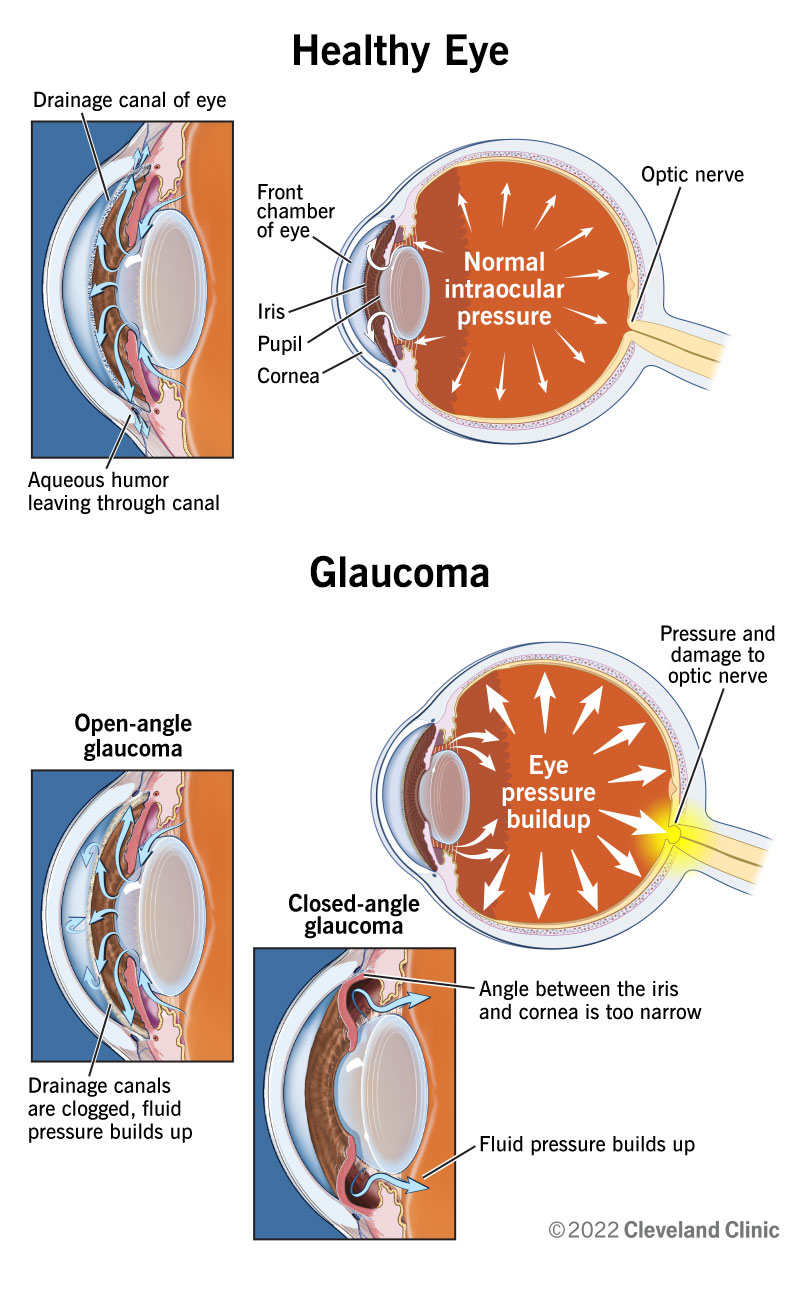Does Weight Loss Help With Glaucoma: Discover the Connection

Yes, weight loss can help with glaucoma. Losing weight reduces eye pressure, which can benefit glaucoma patients.
Glaucoma is a serious eye condition that can lead to vision loss. It occurs when the pressure inside the eye is too high, damaging the optic nerve. Managing this pressure is crucial in treating glaucoma. Weight loss is one method that can help.
Shedding extra pounds can lower eye pressure and improve overall eye health. This natural approach to managing glaucoma can be effective and safe. In this blog, we explore how weight loss impacts glaucoma and what steps you can take to achieve it. Stay with us to learn more about this important connection.
Introduction To Glaucoma
Weight loss may help manage glaucoma by reducing intraocular pressure. Lower body weight can improve overall eye health.
What Is Glaucoma?
Glaucoma is an eye condition. It damages the optic nerve. This nerve is vital for vision. High pressure in the eye often causes this damage. Over time, it can lead to blindness. Early detection is crucial. Regular eye check-ups can help. Treatments can slow or stop vision loss.
Prevalence And Impact
Glaucoma affects millions worldwide. It’s a leading cause of blindness. Both older and younger people can get it. Many don’t know they have it. Vision loss from glaucoma is permanent. Quality of life decreases with vision loss. Daily tasks become hard. Driving, reading, and recognizing faces are challenging. Regular eye exams are important.
Understanding Weight Loss
Weight loss happens when the body uses more calories than it eats. This can be due to less food intake or more physical activity. The body then uses stored fat for energy. This leads to a reduction in body weight. Losing weight can also reduce stress on the eyes. This can help with conditions like glaucoma.
There are many ways to lose weight. Some people follow a diet plan. Others increase their physical activity. Some popular diets include low-carb and keto. Exercise can be walking, running, or swimming. Some people use a combination of diet and exercise. This can be very effective. Tracking food and activity can also help. Keeping a journal can show progress. It can also keep motivation high.
Link Between Obesity And Glaucoma
Obesity can harm eye health. Extra body weight may lead to higher eye pressure. This pressure can damage the optic nerve. This nerve is crucial for vision. Fat tissues can cause inflammation. This inflammation is not good for your eyes. It can lead to glaucoma. Glaucoma is a serious eye condition. It can cause vision loss.
Many studies link obesity and glaucoma. Research shows a strong connection. People with obesity have a higher risk. They are more likely to get glaucoma. Losing weight can help. It can lower eye pressure. This can reduce the risk of glaucoma. Healthy habits are important. Eating well and exercising helps. These habits can protect your eyes.

Credit: assileye.com
How Weight Loss Influences Glaucoma
Weight loss can reduce intraocular pressure. Lower pressure helps ease glaucoma symptoms. Extra weight may put pressure on the eyes. This can make glaucoma worse. Losing weight reduces this pressure. It can slow down vision loss. Healthy weight means healthier eyes. Better overall health helps too.
Weight loss improves blood flow. Good blood flow is vital for eye health. It helps nourish the eyes. Better nutrition means stronger eyes. Stronger eyes can fight glaucoma better. Healthy habits like exercise help both weight and eyes. A healthy diet supports this too. Every bit helps in the fight against glaucoma.
Benefits Of Weight Loss For Glaucoma Patients
Losing weight can lower blood pressure. High blood pressure can harm your eyes. Less weight means less stress on your heart. This helps your eyes too. Lower stress can reduce the risk of glaucoma.
Healthy weight means better blood flow. Good blood flow is key for eye health. Eyes need nutrients from blood. Better blood flow means eyes get more nutrients. This can help in keeping glaucoma at bay.
Healthy Weight Loss Strategies
Losing weight may lower eye pressure, potentially benefiting those with glaucoma. Shedding extra pounds can also improve overall eye health. Always consult your doctor for personalized advice.
Dietary Changes
Eating the right foods can help with weight loss. Choose vegetables, fruits, and whole grains. These foods are low in calories but high in fiber. Fiber helps you feel full longer. Avoid sugary drinks and snacks. Drink water instead. Eating smaller portions can also help. Use a smaller plate to eat less. Avoid fast food and fried foods. Cook meals at home more often.
Exercise And Physical Activity
Daily exercise is key to losing weight. Walking is a great start. Aim for 30 minutes of walking each day. Try other activities like biking or swimming. Exercise with friends to stay motivated. Even household chores can help. Clean the house or mow the lawn. Take the stairs instead of the elevator. Every bit of activity counts.
Medical Interventions
Medications can help manage glaucoma. They reduce eye pressure. This pressure is called intraocular pressure (IOP). Eye drops are common. They lower fluid production or increase drainage. Oral medications may also be used. These include carbonic anhydrase inhibitors. Some patients may need both types. Regular check-ups are crucial. Doctors monitor effectiveness and side effects. Weight loss may enhance medication results. Less body weight can reduce IOP naturally. This helps medications work better.
Surgery is another option for glaucoma. It is used when medications fail. There are several types of surgery. Laser surgery is common. It increases fluid outflow. Another type is trabeculectomy. This creates a new drainage pathway. Minimally invasive glaucoma surgeries (MIGS) are newer. They are less risky. Weight loss can make surgeries safer. Less fat means lower anesthesia risk. It also promotes faster healing. Consult your doctor to choose the best option.
Success Stories And Case Studies
Many patients share their stories. Some noticed vision improvement after losing weight. One patient, Jane, saw better results after shedding 20 pounds. Her eye pressure dropped. She felt better and more energetic. Another patient, Tom, experienced fewer symptoms. He lost 15 pounds through diet and exercise. His vision improved significantly.
Clinical trials show interesting results. In one study, participants with glaucoma lost weight. Their eye pressure decreased. This led to better eye health. Another trial had similar findings. Weight loss helped lower the risk of glaucoma progression. These results give hope. Weight loss can be a simple way to manage glaucoma. It may improve quality of life for many.
Conclusion And Future Directions
Weight loss may reduce the risk of glaucoma by lowering intraocular pressure. Future research could explore more links between weight management and eye health.
Summary Of Findings
Weight loss can help with glaucoma. Lower body weight may reduce eye pressure. This is important for managing glaucoma. Many studies support this link. Healthy eating and exercise are key.
Regular check-ups are also needed. This ensures eye health. Doctors can advise on the best weight loss plans. Different methods work for different people. Personalized plans are the best.
Potential Areas For Further Research
More research is needed on weight loss and glaucoma. Scientists should study the long-term effects. They need to look at different age groups. The impact of diet types should also be studied.
Other factors like stress and sleep need attention. These can affect eye health too. New treatments and methods should be tested. This will help find the best ways to manage glaucoma.

Credit: my.clevelandclinic.org
:max_bytes(150000):strip_icc()/glaucoma-treatment-5095933_final-61f016ac68a0465dba418a1bf4dbbca4.jpg)
Credit: www.verywellhealth.com
Frequently Asked Questions
Can Weight Loss Improve Glaucoma Symptoms?
Yes, weight loss can improve glaucoma symptoms. Reducing body weight can lower eye pressure and inflammation. A healthier lifestyle can also support overall eye health.
How Does Obesity Affect Glaucoma?
Obesity increases the risk of glaucoma. Excess body weight can raise intraocular pressure, contributing to the development or worsening of glaucoma.
Is Exercise Beneficial For Glaucoma Patients?
Yes, exercise is beneficial for glaucoma patients. Regular physical activity can help lower intraocular pressure and improve overall eye health.
What Diet Helps With Glaucoma?
A diet rich in fruits, vegetables, and omega-3 fatty acids helps with glaucoma. These nutrients can support eye health and reduce inflammation.
Conclusion
Weight loss may help manage glaucoma symptoms. Healthy weight supports overall eye health. Exercise and balanced diet contribute to better vision. Always consult your doctor for personalized advice. Every step towards a healthier lifestyle counts. Take action today for your eye health.
Keep learning and stay informed. Your eyes deserve the best care.









